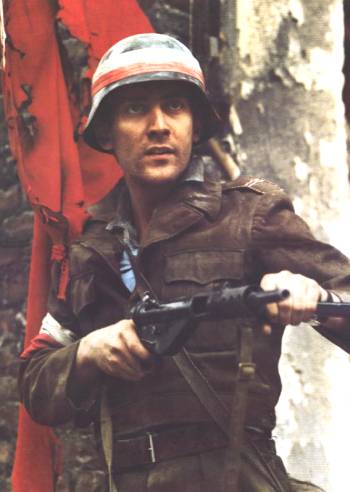 | ||||||||||
Pierscionek z orlem w koronie [The Crowned-Eagle Ring]
 fot: Renata Pajchel |
Aleksander Scibor-Rylski's novel The Horsehair Ring appeared twenty years after it was written, in an already free Poland. It was no wonder that it came into my notice, and that I gave permission for the following announcement to appear on the cover: "The novel to be filmed by Andrzej Wajdaö. Moreover, I found in it all the themes so well known to me from my earlier films, above all the hero and his Home Army (AK) background, the Warsaw Uprising and the first days after "the liberation". I felt at home, among people and issues so well known to me... for the first time in my life unconfined by any censorship.
What can be learned in forty years of making films? What can one be sure of when commencing yet another, the thirty-second? Not much, perhaps. Because everything that I had done so far came under the scrutiny of an entirely different audience, with which, in its time, I sought an answer to the question of how to live in an enslaved world. The films of those years served such considerations well. Closed out and deprived of contacts with the Western world, we sought communion with Europe through film. Unfortunately, my truth about those times was no longer useful for anyone, especially for those who today come to a movie theatre, which has resumed its former function: to amuse and to horrify.
Andrzej Wajda
Reviews
The opening scenes of the film - the Warsaw Uprising - grab the viewer by the throat. (...) We saw it, more, we felt it physically, I felt it and other people also confirmed that shivers ran down their spines; staring motionless at the screen, we felt the captivating truth of the cinematic image which in five concentrated minutes was able to express the one hundred and fifty pages of a novel by no means verbose. This initial tension lasted a while longer: the scene of the exile from a defeated Warsaw, the episode with the mother of the lost Uprising fighter. (...) In any event, a kind of urgency relative to the overall length of the film, which was difficult to accept with full confidence and approval, was fairly soon felt in the version presented to us.
What happened? I think that the daring abbreviation of the first part of the novel, the reduction of the story to its bare skeleton for the sake of explosive symbolism, worked well for the picture. However, the elimination, in the second part, of all chance accidents and politically neutral aspects of youthful existence - the joy of rebirth, awakening to a new life with its intense, violently satisfied eroticism - and playing instead on one note, as well as the ideology, unequivocally pointed out, do not improve the credibility of the whole construction. (...) Wajda has, of course, some assets of his own - at the beginning and also later there is no shortage of brilliant images, to mention only the entry of the Red Army and its march towards the West, or the key episode at the train station, especially the scene in its warm interior, beginning with the entrance of the NKWD officers with their ironically polite "perhaps we are disturbing you?"(...)
But speaking of what is excellent in Ring, it is difficult not to feel a certain regret that this excellence did not suffice for all the elements of the film. From yet another standpoint, this is perhaps the only one director in Poland from whom we dare demand perfect resonance with our spiritual state and familiarity with the pain and anxiety of his homeland, thus recognizing his special place in the spiritual life of the nation. Perhaps this is the reason for sometimes excessive criticism.
Wiktor Woroszylski
"Kino", Warsaw, April,1993
Ring can be regarded as the real end of the "Polish school" of the years 1956 -1959. In terms of ideas, it is far more complicated than Ashes and Diamonds, where the Home Army hero died, killed by accident by soldiers of that other Polish army, marching from the East. In Ring, good and evil are not so radically separated, resulting in a much cooler reception. A hero of the Home Army could not possibly have cooperated with the communists! - runs the complaint. But even if the scriptwriter, now dead, exaggerated a little, I see in this film by himself and Wajda an attempt to analyse the origin of that cooperation with the communists, which in the years 1945 - 1989 was, after all, undertaken by the entire nation.
Jerzy Plazewski
"Film und Fernsehen", Berlin, February 1993
Oscar | Films | Theatre | Why Japan?
Favourites | Pictures gallery | About Wajda | Bibliography
Main Page | Search | Wersja polska
Copyright © 2000 Proszynski i S-ka SA. All rights reserved